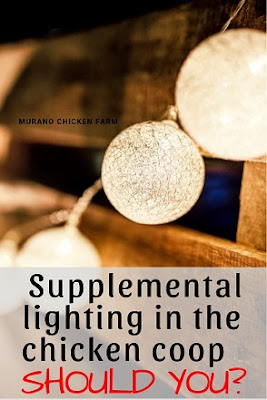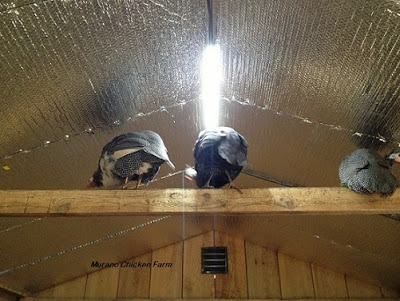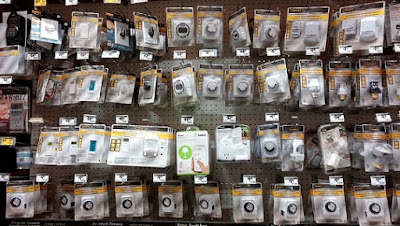Lots of people talk about how they add lights to the chicken coop and "voila" egg production comes back! Does it really work that way though?
Well, yeah it sorta does. I had lights in my coop way back in the beginning when I first started raising chickens. I did this for 2 or 3 years before I quit. It really wasn't worth the hassle.
However, I jotted down some notes on my experience and I'm here to tell you everything I learned about lighting the chickens coop in winter.
Related reading: Tracking egg production in hens, free printable chart.
First of all I must mention that I'm only discussing light not heat. I don't like to heat my coops in winter because I don't believe it's necessary, plus it can be dangerous. A normal lightbulb that you would use in your house will add enough light to the coop.
Some people hang outdoor rope lighting which looks great and has the added feature of the tiny bulbs being protected from the chickens by a plastic covering. Others hang the outdoor party lights on a string style lights in their coops.
LED lights are a cost efficient, easy to install option. I have them in 2 of my coops. I talk about the ones in the picture in the post: Household Objects That Work Amazingly Well In The Chicken Coop.
Adding lights to the chicken coop in winter
Should you?
Chickens have the best egg production when there is 14 -16 hours of sunlight in the day. In the winter the days get shorter and can go all the way down to 8 hours of daylight each day. If you decide to add lighting to your chicken coop you'll want to add just enough light to get them back to that 14-16 hour window.
You don't want to go over that window though, as too much daylight can stress hens out. Stress causes a drop in egg production and you'll be right back where you started!
The first downside of lighting the coop is that you must have electric in your coop to add lights. The first year we just ran a heavy duty outdoor extension cord to the coop, but by the second year we had installed electric.
I actually prefer having the electric option in the coop. There are times in the summer that you may need light after dark and if you relied on an extension cord in winter, you'd obviously put it away then have to use flashlights in summer. Having a light switch in the coop just makes things easier.
Many people like to use solar lights in their coops. I've seen some really cute decorative solar lights used in chicken coops. The Christmas style string lights are especially popular since the panel is often on a cord a few feet long. As long as you can put the panel in the window it should get enough light to work.Unfortunately there is one big problem with this type of solar light. They come on after dark each night. Ideally coop lighting should be set to come on early in the morning and go off right after the sun comes up to mimic normal daylight hours.
However solar lights do tend to fade when they go out, not turn off abruptly, so the chickens get the clue and put themselves to bed before it's pitch dark.
You could go the solar panel route with lights and a timer attached. That is more expensive initially though, plus a little harder to install. It does cut out the electric bill in the long run though and shouldn't need replaced every year or so like the decorative garden lights would.
When to light up the chicken coop
It makes the most sense to add light in the morning. Chickens take their cue to go back to the coop and roost from the sun setting....that gradual darkening. By adding light in the morning, they still experience that gradual darkening in the evening that tells them to go to bed and dusk provides enough light for them to get situated on their roost.
If you add lighting in the evening, then when the light turns off abruptly the chickens have not received those clues to roost yet. They then have to find their way up to their night time perches in the dark, or sleep on the floor.
Since none of us want to wake up every day at 4:30 am just to turn the coop lights on, you'll need a timer. Any hardware store should have an assortment of timers ranging from $5-$30. The cheaper one works just fine.
I have one and used it in the coop with no problems. I also have the fancy outdoor one with the remote...which frankly was a waste of money! Stick with the cheap ones, they're easier to program anyway. lol
Will chickens sleep with the lights on?
Yes, chickens actually will sleep with the lights on. However, it's kind of like when you sleep with the lights one...it's not as easy to get a deep sleep as when it's dark. Therefore, you do need the lights to turn off for bedtime. That is why the timer is necessary.
Just let them start their day a little earlier than you do if you want to light the coop.
How to add supplemental lighting to the coop
Start after the fall molt.
Hens stop laying eggs during molting as all their energy goes into producing new feathers. Once molt is over they would return to laying but at this point the daylight hours are too short. By adding your supplemental light at this point, the chickens start laying when their bodies are able to put the energy into egg production.
Don't give up halfway through the season.
If you're going to light the coop you need to commit to it until the days get longer again. If you try to change your mind after a month or two and suddenly turn off their 14-16 hour a day artificial sun, the hens could go into molt.
As you know, chickens lose their feathers when they molt. Molting in the during winter leaves the chickens exposed to the cold and could be detrimental to their health.
Adjust as spring nears.
Be prepared to adjust the lighting again as spring approaches. After the winter solstice, daylight hours get longer....but they do it slowly. I'm talking a few minutes longer each day. That's s-l-o-w! Since you're artificially adding a few extra daylight hours to the coop, you'll need to back it up slowly too.
Even though 14-16 hours of daylight are needed for ideal egg production, 17 hours or more can cause egg production to drop!
Every few weeks you'll want to shorten the amount of time your lights are on. Simply take away 20-30 minutes at a time from the start time. Since the daylight is lengthening on the other end of the day, it will make up for it.Why I don't add light to my chicken coop
I'm sure you're wondering why I no longer add light to my chicken coops in winter. I decided it was more in tune with nature to let the hens have a winter break than to add artificial lighting to their coop.
I also stumbled upon the idea of getting my pullets later in the year, so they're just getting in the swing of laying when winter hits. I explain how that works in How to Get Fresh Eggs Year Round. A few new pullets provide me with enough eggs to last through the barren months of winter till the rest of the flock starts laying.
I raise a few breeds known to lay in winter. I've raised buff Orpingtons, golden comets, silkies and black stars and they have all laid eggs all winter long. They don't lay as many eggs in winter, but they still do a pretty good job of keeping the egg basket stocked.
My Marans do an ok job of laying in winter, but they're not as consistent as the other breeds I mentioned.
Ducks will lay year round. I currently raise khaki Campbell ducks and I get an egg from every duck, every single day, even in the dead of winter. I have 3 duck hens and get more duck eggs than we could ever eat!
Should you light the coop in winter?
I believe that everyone should make the decision that best suits their flock. I've heard it said that a hens number of eggs is finite and by encouraging her to lay all winter she will run out sooner or become unhealthy because she doesn't take a winter break.I have spent several years both lighting and not lighting the coop in winter and I have not noticed a difference in the health or laying habits of my hens long term.
Artificial lighting can increase the incidences of blood spots in chickens eggs. That's not really a huge problem though.
Obviously that doesn't mean that opinion is wrong, but a hen is born with the potential to lay thousands of eggs and it's sincerely doubtful that she can 'run out' of eggs. Generally winter egg production doesn't pick up to the same level as in summer anyway.
Consistency is key and forgetting to turn the lights on will result in egg laying dropping off again.
Be careful of wires and light bulbs around chickens (they peck at everything!) and never forget that any type of electric in the coop can be a fire hazard in the wrong conditions.
Need more information on cold weather chicken care? Check out all my posts on raising chickens in winter!
~L
Want information on raising chickens sent right to your email weekly? Click right here to join my list and get new posts sent directly to you the day they're published ... plus, you'll also get the free download '25 Ways to save money raising chickens'.






No comments:
Post a Comment